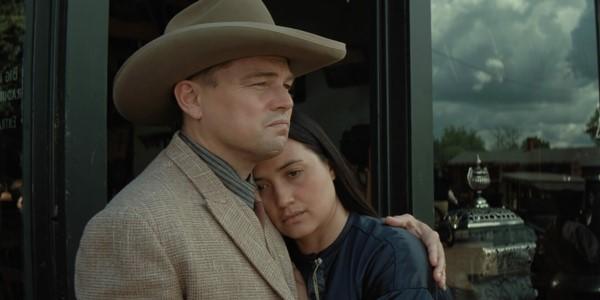A forthcoming London Jesuit Centre course will explore how film can be a medium for theological reflection, and how ideas are animated and given shape by stories. Stuart Jesson finds a formidable example of film’s affective power in the work of Martin Scorsese, who often presents us with characters struggling to make sense of their own stories. What can we learn from their quests for meaning, satisfaction and happiness?
SPOILER ALERT: This article contains details of the plot of Killers of the Flower Moon and other films.
After a first viewing, my sense is that even though Martin Scorsese’s latest film, Killers of the Flower Moon, is far too long, the innovative and deeply affecting ending somehow makes it worthwhile. There is already a fair bit written about this, for those who are interested.[1] There is also a fair amount of discussion of what the film excludes, or fails to be properly attentive to: does it give sufficient attention to the broader history that preceded the Osage murders, or the legislation that shaped the context in which they happened? And so on.[2]
But for me, perhaps the most striking thing about the film is that, when considered in a moral light, and from one particular angle, Killers of the Flower Moon tells a very similar story to Scorsese’s previous film, The Irishman. Both films can be seen as stories about men who become hopelessly fragmented, and lose themselves; men who find out – before their lives are over – that their lives have turned out badly. As the FBI agent Tom White says to Ernest Burkhart towards the end of the film: ‘I don’t think your life was meant to turn out this way’.
The Catholic philosopher Robert Spaemann, in commenting on Aristotle’s concept of eudaemonia, says that we should think of eudaemonia as ‘a life that turns out well’.[3] Eudaemonia is normally translated as ‘happiness’ or ‘flourishing’. Aristotle used this word to describe the highest or final good of human life: that which is valuable in itself, not for the sake of anything else. Eudaemonia is not only that which is most desirable, it is that for the sake of which we desire anything else (we want money, for example, because we think it will bring us happiness). But of course, on its own, this doesn’t tell us much: what, exactly, do we desire when we desire happiness, or flourishing; what does it look like? Aristotle’s conception of eudaemonia focuses on rational self-governance; he thought that for human beings – the rational animal – eudaemonia must consist in a distinctively rational kind of activity: guiding our own lives in a virtuous way through the use of reason.
Spaemann wants to emphasise how paradoxical it is to talk about life ‘turning out well’. For one thing, it seems to require us to think of our lives both subjectively, as lived from the inside, and objectively, from an external perspective. Eudaemonia cannot be something purely subjective, as if what we want when we want ‘happiness’ is just to live through as many individual moments of pleasure as possible. A life filled with innumerable pleasurable moments would still be undone by the belated recognition that, in reality, this pleasure was empty – all ‘for nothing’. But nor is eudaemonia something purely objective, like ‘success’ or ‘excellence’, which can co-exist with subjective dissatisfaction. Ronnie O’Sullivan, for example, is an objectively excellent and highly successful snooker player, even if he often seems not to enjoy it all that much, or to be unsure whether that success has been for the best, all things considered.[4] But a person would not judge their life to have ‘turned out well’ if they themselves were not, from the inside, glad to be living it, and pleased with it. (This is perhaps why Nietzsche thought that the most important thing, finally, was to find a way to ‘attain satisfaction’ with one’s life).[5] Eudaemonia is not an end that can be separated from the living moments that make up one’s life, as they are experienced. It is somehow both subjective and objective at the same time: the desire to be happy is the desire actually to live, and know oneself to be living, a life that ‘turns out well’.[6]
Perhaps most problematic is the fact that no-one’s life has ever fully ‘turned out’ until it is over, it is always like a plot that may yet undergo a twist or two. An apparently upright life, filled with noble deeds, can be ‘ruined’ in the final chapter by a shocking revelation from the past; a life of apparent mediocrity and repeated failure can be transfigured by a moment of heroism, generosity or sacrifice. As long as one is alive, the question of what one is – what kind of story one is telling with one’s life – is still open.[7] Equally, most people don’t end their lives at a point where everything has settled into place; death, for most, is not like the end of a symphony, arriving at just the right moment. Heart attacks don’t arrive on schedule, just after longstanding familial arguments have finally been settled; cancers progress regardless of whether someone has achieved all they were capable of, or feels that they have discovered, at last, who they were meant to be. And most people live lives that don’t seem to be just one story at all. Most lives are full of chance happenings, false starts, inconsistencies in our aims and intentions, meandering periods of drift and quite a bit of necessary, but uninteresting, daily grind. How can all this add up to one thing, let alone one thing that can be said to have ‘turned out well’?
All of the above is one reason why narrative in general, and films in particular, can be so powerful, and affecting: they appeal to our need to see and survey life as a unity. Narrative is one of the ways – perhaps the way – in which we try to bring unity to disparate events that seem not to belong together.[8] But narratives need endings to become a unity; until a story ends, we can’t really know what to make of it. Interestingly, endings can bring a sense of unity even if they leave important plot threads completely up-in-the-air.[9] The ending of a film casts a kind of light back over the events it has depicted. The meaning of the whole is altered if the ending is changed, which is one reason why the discovery of an alternative ending or ‘director’s cut’ can be so unsettling: the revised ending means that we have to re-think what everything else means (as for example, in the director’s cut of Ridley Scott’s Blade Runner, or Jane Campion’s original ending of The Piano).[10]
So there is a natural affinity between narrative, and the question of eudaemonia – the question of what it means for a life to ‘turn out well’. Martin Scorsese’s films have often been focused, not on the question of what it means for life to turn out well, but what it means for it to turn out badly. Raging Bull begins with the sad contrast between Jake LaMotta in his boxing prime, and what that same Jake LaMotta became – how it has ‘turned out’ for him. Goodfellas, despite the stylishly amoral violence on the surface, builds up towards a moral interrogation of its audience, as we consider not just how life turned out for Ray Liotta’s Henry Hill, but how attracted we are to the life that Hill has lived. The film begins with Henry’s famous words, as he recalls his envy of the lives of the mafiosos in his neighbourhood: ‘As far back as I can remember, I always wanted to be a gangster.’ We might ask: why would anyone want to be a gangster; why are they to be envied? As Henry explains this clearly, he echoes the words of Polus in Plato’s Gorgias: they seem like real ‘somebodies’ and they get to do whatever they want![11] Who wouldn’t want that?
The film goes on to show us what it is like not just to desire that apparent ‘happiness’, but to seem to achieve it. But crucially, the end of the film is not just a neat moral lesson worthy of the Hays Code (criminals never prosper in the end), it is a question directed at the audience. Henry Hill steps down from the witness box, and addresses the audience directly: ‘we had everything… everything was for the taking. And now it’s all over… I’m an average nobody.’ Hill is not worried about how to atone for the moral failures of his past, nor about how to integrate his criminal past with his present existence meaningfully; he’s just sad that ‘it’s over’. But then, with a slight rueful smile playing on his lips, as he briefly remembers the ‘good old days’, Liotta looks straight at the camera from the doorstep of his unremarkable suburban home as if to ask the audience: and can you honestly say that you would not have enjoyed it while it lasted? In some ways, the whole of Goodfellas is an attempt to seduce the audience into acknowledging that perhaps we, like the young Henry Hill, have at some level ‘always wanted to be a gangster’. After all, we have just spent two-and-a-bit hours invested in their world – not in the boring life of an ‘average nobody’. Scorsese wants us ask whether our own conception of eudaemonia is rather closer to Henry’s than we would like to admit.
But in his two most recent films, Scorsese seems to be focused even more seriously on what it would be like, and what it might mean, for life to turn out badly. A recent article in The New York Times suggests that this is an extension of Scorsese’s long preoccupation with ‘unwise guys’; men who are victims of ‘self-absorption without understanding’.[12] But in these two recent films, it seems that we are presented not so much with self-absorption, but with something like ‘willed loneliness’; a loneliness caused by deeply divided loyalties.[13] And returning to a theme that emerges at the beginning of his breakthrough film, Meanstreets,[14] both The Irishman and Killers of the Flower Moon show us men unable to confess; not to what they have done, but to what they have become. Because they cannot bring their real selves into the presence of others, they lose the capacity to be close to those they love; and this, it turns out, is what it means for one’s life to turn out badly.
The moral crux of The Irishman is Frank’s pathetic phone call to Jo Hoffa, the wife of Jimmy Hoffa, Frank’s own close friend. As far as Jo knows, her husband is missing; Frank, however, knows that he is dead because he was the one who killed him, and disposed of the body. But as a close friend of the family, Frank is obligated to call – to offer support, comfort and assistance if needed. Frank, understandably, has been avoiding this direct confrontation with the fragmentation in his life, and the divided loyalties that run through it. He voices his discomfort to his wife and daughters: ‘I should call Jo…’. His wife remarks, with surprise, and a hint of accusation: ‘You haven’t called Jo yet?’ But it is the simple question from his quietly furious daughter, Peggy, that gets to the important point: ‘Why?’ Frank pretends he doesn’t hear, so she repeats herself; the second time he pretends he doesn’t understand: ‘Why what?’ Peggy repeats the question a third time with a steady and accusing gaze: ‘Why haven’t you called Jo?’ (Scorsese has learned from the gospels that sometimes the most important questions have to be repeated three times.) She knows why he hasn’t called, and he knows that she knows. So Peggy’s question to Frank, like Jesus’s to Peter, is a form of what moral philosopher Stephen Darwall calls ‘second-personal address’.[15] It is asked in a way that presumes, and expresses, mutual moral accountability. Peggy’s quiet anger and outrage, expressed in this question, comes with an ‘RSVP’; it’s an invitation for Frank to account for himself, just as God’s question to Cain (‘where is your brother, Abel?’) is a summons to accept responsibility, not a request for a location. Rather than attempt to answer for himself, Frank goes upstairs to phone Jo. As he picks up the phone, and awkwardly struggles to utter the most unconvincing of clichés to the distressed woman (‘you know, you gotta think positively’), he is completely lost, and totally bewildered with himself. His life has become hopelessly fragmented, divided between competing loyalties, expended in pursuit of that which turns out to be working against him. And because he is internally fragmented in this way, he loses the capacity to be truly with those he loves.[16]
Towards the end of Killers of the Flower Moon we see a moment that is intriguingly similar. A dignified but shattered Mollie confronts her husband, Ernest – a man who, she discovers, has not only been complicit in the murders of many of her family members (including her pregnant sister) but who was also for a time poisoning her on a daily basis, so as to keep her from investigating those murders: at the instigation of his uncle, Ernest begins to add morphine to Mollie’s daily insulin injections. In view of this astonishing betrayal, Mollie’s love for Ernest is perhaps the central mystery of the film (there is never any real doubt about who is responsible for the murders).[17] And Ernest really does seem to love Mollie; but he has another love, as he enthusiastically confesses to his uncle towards the start of the film: ‘I do love that money, sir!’ Like Frank, Ernest is driven by a mixture of greed, misplaced loyalty and inertia, and it will be the ruin of him. Ernest ends up confessing to his part in the murders, but after his conviction, Mollie gives Ernest the opportunity to make the confession that really matters, to her. She visits him, and asks: ‘What did you give me?’ This, again, is not just a request for information; Mollie is not, I don’t think, primarily interested in the specific details of what was in the needles. Rather, she wants Ernest to account for himself to her. Motivating her interrogation is a harsh kind of generosity, because her love for Ernest means that she wants him to be able to be with her – if only for a few final moments. Like Peggy’s, Mollie’s question is designed to pierce through to his heart, because whilst Ernest has done objectively worse things than drug his wife against her will, it is this betrayal in particular that he cannot look in the eye, and which stands between them at this moment. Ernest is suffering from an interior fragmentation that prevents him from being with the person he cares about most: he knows that in the end, he chose loyalty to – and perhaps fear of – his uncle, and his love of the money that was ‘flowing freely’ over his wife. So by asking about the injections, Mollie is inviting Ernest to uncover this fragmentation and disloyalty, so as to be fully present to her and so to himself; to be present to her as what he has become (that is, to confess). As love involves the desire for union with the beloved, even this interrogation is motivated by Mollie’s love for Ernest. But he cannot accept this invitation; he just responds with an unconvincing denial that he gave her anything other than the insulin she needed. Like Peggy, Mollie calmly repeats her question. When he retreats further into the lie, she leaves him, seated and slumped, unable to face her or himself, in a state of ‘willed loneliness’.
The Irishman also ends with a failed confession. A priest sits with Frank, valiantly but unsuccessfully trying to elicit some sense of remorse from him for the many, many murders he has committed. Frank is honest: he feels little, if any remorse. And then perhaps it is his memory of his daughter, her unforgiving gaze, and her piercing question, that leads him to ask, apparently out of the blue: ‘What kind of person makes a phone call like that?’ The priest has no idea what he is talking about, because Frank can’t bring himself to describe that phone call. Why is Frank more concerned about the phone call than about the murders? Because the day of the phone call was the day his relationship with Peggy ended; and perhaps because the phone call itself was a sign of the deep fragmentation that ran through his life: obliged, as a friend, to comfort a woman whose pain he has directly caused. And perhaps the shame of the phone call is also that it was Frank’s botched attempt to keep up the appearance that his life was whole and unified. The film’s unflinching answer to Frank’s question – ‘What kind of person makes a phone call like that?’ – is that he is: he has turned out to be that kind of person. As the camera backs slowly out of Frank’s room, we hear him say, feebly, that he doesn’t like the door to be closed. Scorsese wants us to know that life can turn out badly. Or, in Jesus’s words, that gaining the whole world won’t count for much if one loses one’s life in the course of living it.[18]
Stuart Jesson graduated with a degree in Literature and Theology from the University of Hull in 2000. From 2003-9 he studied Philosophical Theology part-time at the University of Nottingham, whilst continuing to work in the third sector with vulnerably-housed or homeless people, and young asylum seekers. He was lecturer at York St John University for almost a decade, before moving to the London Jesuit Centre in 2021, where he is the lead for theology.
‘Salvation on Screen’ is a five-session course being offered online and in person at the London Jesuit Centre in January and February.
[1] See, for example: https://www.vanityfair.com/hollywood/2023/10/killers-of-the-flower-moon-ending; https://www.gq.com/story/the-killers-of-the-flower-moon-ending-is-an-all-timer
[2] See, for example: https://www.bbc.com/culture/article/20231025-killers-of-the-flower-moon-does-it-do-right-by-native-americans ; https://www.theguardian.com/film/2023/nov/03/indigenous-native-american-review-opinion-killers-flower-moon-movie ; https://www.thedailybeast.com/how-killers-of-the-flower-moon-fails-native-americans-like-me .
[3] See Robert Spaemann, Happiness and Benevolence, trans. Jeremiah Alberg, SJ (Edinburgh: T & T Clark, 2000), esp. chapter 1.
[4] O’Sullivan discussed this in a recent interview for the BBC with Amol Rajan: https://www.bbc.co.uk/iplayer/episode/m001sqkd/amol-rajan-interviews-ronnie-osullivan
[5] See Friedrich Nietzsche, The Gay Science, ed. Bernard Williams, trans. Josefine Nauckhoff (Cambridge: Cambridge University Press, 2001), section 290.
[6] See Spaemann, Happiness and Benevolence, pp. 61-69.
[7] So we have ‘Solon’s paradox’: ‘call no-one happy until they are dead’.
[8] As argued by Paul Ricoeur at great length in Time and Narrative 1-3, trans. Kathleen McLaughlin and David Pellauer (Chicago and London: Chicago University Press, 1984), esp. vol. 1, 3-87.
[9] This, for my money, is why the notorious cut-to-black at the end of The Sopranos is so perfect: it leaves us to ponder the meaning of Tony Soprano’s life – and of our own deep investment in it – at just the right moment, just before the decisive action takes place – or doesn’t. We already know what kind of life Tony is living, regardless of how it ‘ends’.
[10] Famously, the Director’s Cut and Final Cut of Blade Runner have different implications for the question of Deckard’s identity. Less famously, Jane Campion has confessed in interviews that her original intention was for Ada to end up drowned next to her piano at the bottom of the sea. This original vision is still hinted at in the final shot of the film.
[11] In Plato’s Gorgias, the discussion between Socrates and Polus builds up to a crucial ethical question: which do we see as the worse fate – to suffer injustice, or to have become unjust? Socrates wants to turn our whole evaluative perspective on its head by saying: the latter; it is worse to be unjust than unjustly treated. So the tyrant is not to be envied at all, however much they appear to ‘do whatever they want’.
[12] See Jim Shepard, ‘Martin Scorese’s Unwise Guys’: , https://www.nytimes.com/2023/11/29/magazine/martin-scorsese-movies-men-antihero.html.
[13] See Eleonore Stump, Wandering in Darkness: Narrative and the Problem of Suffering, pp. 21, 127-50 and 246 for explanation of the term ‘willed loneliness’.
[14] At the beginning of Meanstreets, Harvey Keitel’s Charlie laments that the traditional Catholic sacramental process ‘doesn’t work for me’: he keeps confessing to the same sins, receiving the same penance, and then repeating the same sins all over again. A priestly voice inside his head tells him: you don’t make up for your sins in church; you do it on the street. Suffice to say that this attempt to ‘make up’ for his sins doesn’t turn out too well.
[15] See Stephen Darwall, The Second-Person Standpoint (Harvard University Press, 2006). On pp. 40-42, Darwall explains what he means by talking about an ‘RSVP’ in this context.
[16] Here I am again indebted to Eleonore Stump’s analysis in Wandering in Darkness: Narrative and the Problem of Suffering. See pp. 108-128, esp. pp. 124-5.
[17] See Scorsese’s interview with Richard Brody in The New Yorker on this point. https://www.newyorker.com/culture/the-front-row/martin-scorsese-on-making-killers-of-the-flower-moon
[18] See Matthew 16:26; Mark 8:36; Luke 9:25.






